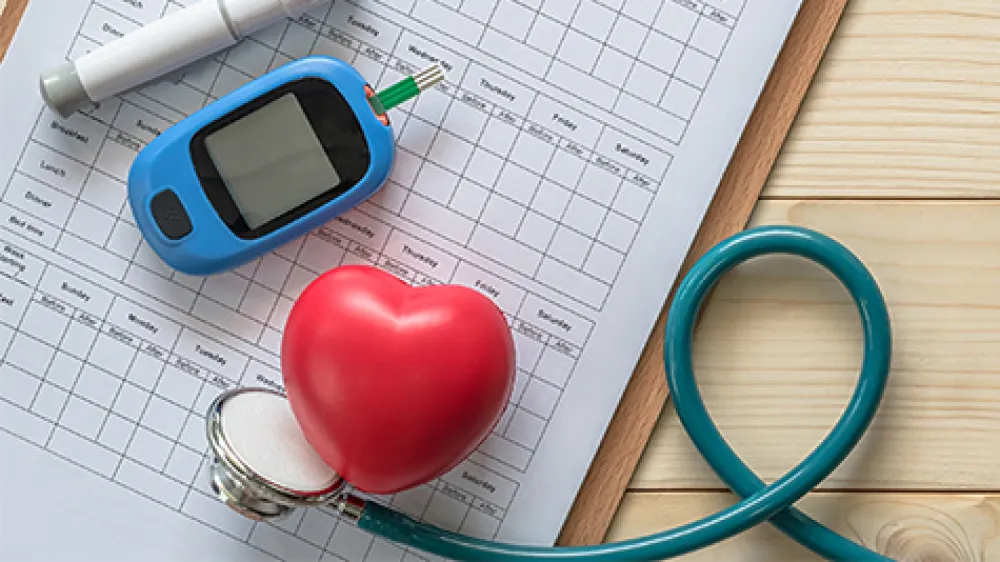Providing your location allows us to show you nearby locations and doctors.
Improving Cardiovascular Outcomes in Diabetes

11/23/2020
It’s ironic that a month culminating in the carb-heavy gluttony of Thanksgiving is National Diabetes Month, but maybe that’s appropriate for America in 2020.
The diabetes burden in America is enormous and somewhat astounding. About 1 in 10 Americans have diabetes and almost 100 million people have prediabetes.
We all know diabetes is bad.
People with diabetes have more kidney disease, more cancer and are more likely to die of COVID-19 than people who don’t have diabetes.
But the biggest killer of folks who have diabetes is heart disease. A huge part of what I do as a cardiologist is treat the cardiovascular complications of diabetes.
Now, I would make the argument that most diabetes is treatable and perhaps even reversible with the right lifestyle modifications (and there are companies out there trying to do exactly that at scale), but the vast majority of people with diabetes will end up on medications.
A big part of the reason for this is official dietary recommendations for people with diabetes are somewhat misguided. But getting the medical therapy right matters a lot as well.
The paradigm of diabetic treatment has changed markedly over the past few years, and if you are being treated by a doctor who isn’t aware of this, you need to be informed so you can get the right treatments.
Diabetes treatment isn’t just about lowering blood sugar
When I was in medical school, the teaching about therapy for diabetes was we couldn’t reduce things such as heart attack and stroke with the right treatments, but we could reduce the risk of vision loss and kidney disease (doctors call this the difference between macrovascular outcomes and microvascular outcomes).
In other words, lowering blood sugar is good, but until recently there was no evidence medicines to lower your blood sugar protected against heart disease.
In fact, there are signals with some diabetes medications that cardiac outcomes are worse compared to placebo. Januvia (sitagliptin) and Avandia (rosiglitazone) are probably the two best examples here. And I still see patients who are on these medications all the time, despite the signal for harm.
Steve Nissen, the famous cardiologist from the Cleveland Clinic, is incredibly outspoken about the problems with taking a glucocentric approach to diabetes treatment.
He’s right. And luckily, the time has come when we can all do this better.
The new frontier of diabetes care
There are two new classes of medications that improve cardiac outcomes in patients with diabetes:
- Sodium glucose transporter 2 inhibitors (SGLT-2i for short)
- Glucagon-like peptide 1 analogues (GLP-1a for short)
These medications are the new standard for diabetes care and the evidence keeps on mounting.
These medications don’t just protect your heart, they also reduce your blood sugar.
SGLT-2 inhibitors are protective against development of congestive heart failure (CHF) in people with diabetes. They’re even actually useful in patients without diabetes who have heart failure and are now part of the standard of care for CHF.
Quite a few of these have shown to have a positive impact: empagliflozin, dapagliflozin and sotagliflozin are the big ones. Canagliflozin, too, but this one has some concern with a signal for rare harms, like possibility of more amputations.
GLP-1 analogues seem to reduce risks of heart attacks and progression of coronary artery disease. They also help with weight loss.
Semaglutide and liraglutide both have benefit in these areas.
Why do these medications work when other ones failed?
This is a great question. While we don’t have the full answers, we do have some ideas about the physiologic reasons why.
It has to do with the biological mechanisms behind how these drugs work and what makes diabetes so harmful. A lot of this starts with insulin.
A lot of the harm with diabetes is caused by insulin resistance, in which our bodies need higher and higher amounts of insulin to keep our blood sugar in check. We get diabetes when we just can’t make enough insulin to overcome this resistance, so our blood sugar rises as a result.
We’ve known about the insulin and heart disease connection for some time. Higher levels of insulin accelerate cardiovascular disease.
Diabetes medications that raise insulin levels aren’t necessarily going to be helpful in reducing cardiovascular problems. However, diabetes medications that lower blood sugar directly thereby lower insulin, possibly helping to avoid the harmful effects of high levels.
To oversimplify things, SGLT-2 inhibitors make us urinate more glucose, which lowers blood sugar and thus means we need less insulin circulating through our bloodstream.
GLP-1 analogues seem to have a slightly different and more complex mechanism of action. They seem to work partly mediated by slower stomach emptying, partly by inhibiting a hormone called glucagon and partly by causing weight loss. The proof of better cardiac outcomes is clear at this point.
The bottom line
If you have diabetes, know someone with it or treat people with it, these are vital treatments to be aware of because they are now the standard of care.
In the time of a pandemic, when metabolic disease, obesity and diabetes are the elephant in the room for bad COVID-19 outcomes, as well as increased risk of cardiovascular disease, updating our treatment strategies for these millions of patients is a vital step forward.
Dr. Gregory Katz is a cardiologist with The Heart Center, a division of Hudson Valley Cardiovascular Practice, P.C., now part of Nuvance Health. For more information on cardiovascular care and The Heart Center, visit www.nuvancehealth.org/heartcenter